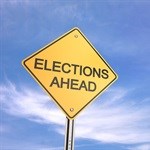This trial has also put Brand SA on the map, but it will also be the outcomes of the elections and the developments thereof which will continue to paint a picture about our country to the international community.
It is twenty years into our democracy, with the recent passing of our iconic leader, Father of the Nation and former President Nelson Mandela, who left us with a legacy, and the responsibility to carry the torch to pick up from where he left off. Are South Africans looking forward to casting their votes, and be active participants in how their country with be managed going forward?

With just a few weeks, ahead of the 2014 elections on 7 May, by passing through the neighbouring streets of Johannesburg one cannot help to see all the political campaign adverts and billboards gazing back at them, from the plethora of existing and new political parties. Each carrying powerful messages aimed at wooing and getting the vote and the support from the average eligible South African.
What do all these campaigns, have in common? They have each positioned themselves as the ideal party to run the country - frosted with endless promises: a futuristic South Africa that we all dream about, with more and better job opportunities for all, alleviation of poverty, a disease-crime-free country with better infrastructure, and an economy that will benefits all.
With over 25.3 million registered voters, of which 2.3 are new voters, most of which are South Africans who were born after the 1994 general election, known as the born-free generation, and are aged 18 or older, this group of people will be eligible to vote for the first time. This is another epic making in our country. It would be interesting, to see what this "born -free generation"'s take on the country is, and what's their motives for voting.
What strategies have each political party plotted taking into account the reach for this audience in proportion to the rest of the country, as far as reach, advertising mediums and most importantly the message that is used to bring awareness, attract and win over their trust?
From my observations, the IEC (Independent Electoral Commission) is doing a great job to reach the youth and the masses. On Twitter, I recently saw how they are using well known media personalities to motivate the youth to vote, they had this tweet: "View a short video on why Shashi Naidoo is voting (http://www.youtube.com/watch?v=sSOM5SiwH98 ...). Retweet if you agree with her #vote7May".
India has also taken the youth into account in its current political marketing strategy for its general 2014 elections. The India elections is projected to cost about $5 billion, making it the costliest election ever in India and the second most expensive campaign in world history, behind only the 2012 U.S. presidential election, which cost some $7 billion, according to the U.S. Federal Election Commission.
Part of this spike in India can be explained by inflation, but also by the fact that politicians seek to appeal to a younger, tech-savvy Indian electorate with more easily accessible campaign venues, more television commercials, digital marketing efforts, closed-circuit live broadcasts of rallies and increased social media and Internet content.
I'm fascinated to see what our overall public spend for the 2014 elections will be. In South Africa, A political party is entitled to an allocation from the Represented Political Parties' Fund for any financial year that it is represented in the National Assembly or in any provincial legislature. In other words, no allocations are made from the Fund to political parties which are represented in municipal councils only (or to those which have no public representatives at all); this is in accordance to the Public Funding of Represented Political Parties Act, 103 of 1997.
In addition to state funding, private funding is also allowed, according to IEC, any political party may also obtain funds from its members and from other sources, such as business (both local and foreign) and civil society groupings. In the past week, I came past one of the election campaigners who asked that I support their party as part of their fundraising initiatives, by simply getting my car washed at a minimal cost, while being given a pamphlet, and given more info about the party and its campaign.
As a marketer, these are interesting observations to see, all the strategies been implemented by the various parties, leading to the elections.
The Ipsos/Sunday Times survey undertaken in February and March 2014 showed that the ANC enjoyed majority support in all provinces except the Western Cape, where the DA retains majority support. DA support followed that of the ANC in all other provinces except for the North West, where the EFF came in second place. I'm curious to see where most South Africans will entrust their votes, especially with new players entering this election cycle, such as Agang SA, Economic Freedom Fighters, (EFF), SAF (South Africa First) and many more.
Exciting times lie ahead, in no time we will have a brand new national assembly occupying 400 seats (members), 200 will be selected from the national party list and the other 200 from the provincial party list and most importantly we will have a brand new president! Let your vote count, folks!